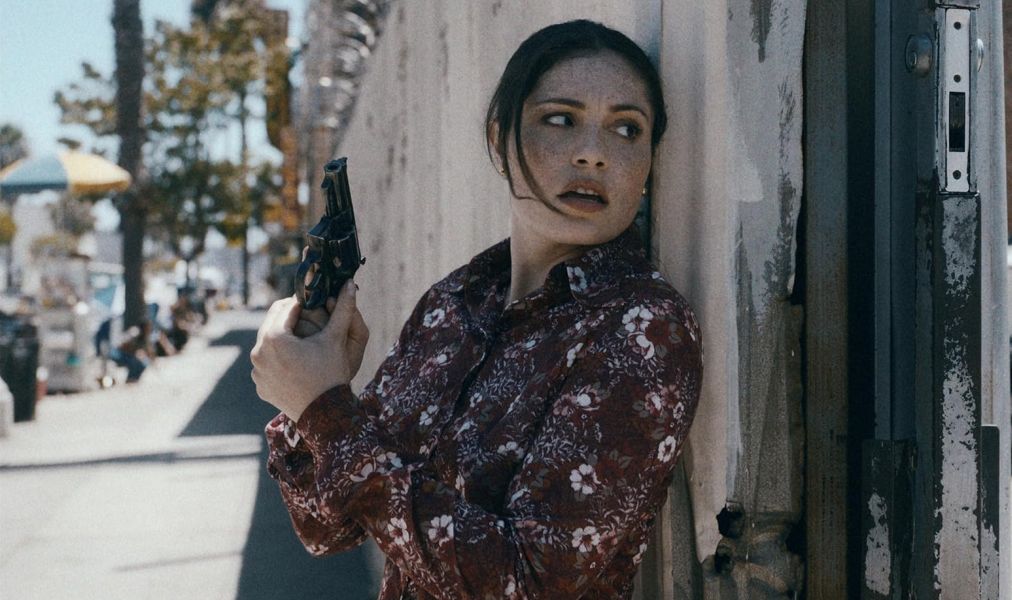 ★★★★
★★★★
“Calor blanco”
 This is far from the first time we’ve covered films, series or documentaries about Griselda Blanco, the drug boss who ruled Miami with a lead fist in the eighties. There was Colombia narconovela La Viuda Negra. Lifetime TVM Cocaine Godmother, starring the not exactly Colombian, Catherine Zeta-Jones. And there was factual retelling, Queen of Cocaine. Now, we get the highest-profile version, made by Netflix and starring probably Colombia’s best-known actress. Albeit best-known for her role in long-running sitcom, Modern Family. We saw her here previously in the underwhelming Hot Pursuit, but this is a very different kettle of fish. Concern was understandable. Would she be up to the dramatic lifting required for such a heavy and complex role?
This is far from the first time we’ve covered films, series or documentaries about Griselda Blanco, the drug boss who ruled Miami with a lead fist in the eighties. There was Colombia narconovela La Viuda Negra. Lifetime TVM Cocaine Godmother, starring the not exactly Colombian, Catherine Zeta-Jones. And there was factual retelling, Queen of Cocaine. Now, we get the highest-profile version, made by Netflix and starring probably Colombia’s best-known actress. Albeit best-known for her role in long-running sitcom, Modern Family. We saw her here previously in the underwhelming Hot Pursuit, but this is a very different kettle of fish. Concern was understandable. Would she be up to the dramatic lifting required for such a heavy and complex role?
Yes. That’s the short answer. She does a fine job of depicting a character whose defining trait, in this rendition, is single-minded determination. It’s an aspect apparent from the start, where she flees her abusive husband in Medellin. Griselda arrives in Miami with her three kids, and little more than the clothes on her back. Oh, and the kilo of top-shelf cocaine, swiped from her spouse. Through sheer refusal to take no for an answer, she finds a buyer and convinces him to give her a shot [she meets him in Miami’s Mutiny club – Chris was actually a member there back in the day!]. When he stiffs her, she reels in a Colombian supplier, convinces him to front her 100 kilos, then creates her own market and network of dealers.
 It’s kinda inspiring, weirdly. Early on, the series can be seen a twisted version of the American dream, where an immigrant can come to America, pull themselves up by their bootstraps, and anyone can achieve success if they work hard. The reality is, Blanco didn’t arrive in Miami seeking asylum from domestic abuse, but fleeing increased law-enforcement heat for drug trafficking in New York. Not exactly what Vergara described the show as, depicting “How beyond all odds, a poor uneducated woman from Colombia managed to create a massive, multi-billion dollar empire in a male-dominated industry, in a country that was not her own.” You go, #girlboss! #slay!
It’s kinda inspiring, weirdly. Early on, the series can be seen a twisted version of the American dream, where an immigrant can come to America, pull themselves up by their bootstraps, and anyone can achieve success if they work hard. The reality is, Blanco didn’t arrive in Miami seeking asylum from domestic abuse, but fleeing increased law-enforcement heat for drug trafficking in New York. Not exactly what Vergara described the show as, depicting “How beyond all odds, a poor uneducated woman from Colombia managed to create a massive, multi-billion dollar empire in a male-dominated industry, in a country that was not her own.” You go, #girlboss! #slay!
Often literally. For her chosen profession here is thoroughly illegal, and the hard work involves ordering brutal violence against your rivals and enemies. This might be a cause for concern. But who are we to quibble? The makers have said they didn’t want to make a hero(ine) out of her. Neither did Brian de Palma, and yet, you can buy Scarface T-shirts. The market decides for you, and the way it depicts the violence for which Blanco is responsible seems more like an attempt at plausible deniability. It’s the usual double standard of Hollywood: making disapproving noises, while also depicting Griselda strutting glamourously out of the Mutiny, blood spattered on her cheek from a recent victim.
Griselda has a strict zero-tolerance for anyone who thinks she is a soft mark because she’s a woman. Especially in the early part of her career, was quite willing to wield a baseball bat or gun to that end. Later on… well, she had people for that sort of thing. But as we head into the second half, things get progressively darker. Griselda starts to become paranoid, suspecting the people around her – an attitude not helped by her taste for smoking crack. She believes there’s an informant in her circle, and takes brutal action against those who she thinksit might be. Things peak at a birthday party for Dario (Guerra), her third husband. It ends in Griselda letting loose with her gold-plated MAC-10 (top).
The irony is, there’s no informant: just good police work. For on the other side of the law, the series gives us June Hawkins (Martinez, bottom), intelligence analyst and detective in the local police force. She was also a real person, one who played a significant role in the pursuit and capture of Griselda, being one of the first to realize a woman had taken over the drug trade in Miami. I suspect her role was likely inflated somewhat, in order to act as a counterpoint to her target: co-creator Doug Miro admitted about the character, “There’s a fair amount of artistic license.” That applies to the whole series, though I’m not inclined to complain.
It is a fairly straightforward rise-and-fall, charting first Griselda’s path up to the top, when she was earning $80 million per month. This is followed by the slow but likely inevitable collapse, as her business rivals and law enforcement catch up with her. We know how the story eventually ends – in a pool of blood outside a Medellin butcher’s shop. The series doesn’t bother going all the way to the end. It finishes with Blanco released from jail, sitting on the beach. But it’s not a happy ending, having just been told that she has lost almost everything for which she worked: three of her four sons have been murdered. Conventional morality wins out in the end.
 In terms of production value, this is definitely several slices above the other efforts, even if Los Angeles stood in entirely for Miami (the latter no longer resembling what it was at the time). Of particular note is the make-up work on Vergara. It must have been a challenge, because events unfold over a significant number of years: your lead is, obviously, more or less fixed at a point in time. Initially, there’s little of note, but it gradually builds up, in a way that’s so subtle you might not notice. Until, by the end, you suddenly realize the character no longer looks like the actress. Though still rather prettier than the real Griselda.
In terms of production value, this is definitely several slices above the other efforts, even if Los Angeles stood in entirely for Miami (the latter no longer resembling what it was at the time). Of particular note is the make-up work on Vergara. It must have been a challenge, because events unfold over a significant number of years: your lead is, obviously, more or less fixed at a point in time. Initially, there’s little of note, but it gradually builds up, in a way that’s so subtle you might not notice. Until, by the end, you suddenly realize the character no longer looks like the actress. Though still rather prettier than the real Griselda.
I highly doubt this will end up being the final or even the definitive version of the Griselda Blanco story. The last surviving son, Michael Corleone, filed suit against Netflix, and reports indicate he has his own version of the family story he would like to tell. For now, however, this is the best adaptation of her life. If obviously skewed towards a questionable message of feminist “empowerment” which the makers wanted to send, Vargas’s strong performance holds the strands together and makes for a captivating experience.
Dir: Andrés Baiz
Star: Sofía Vergara, Alberto Guerra, Martin Rodriguez, Juliana Aidén Martinez





